This research describes the findings of a study into unpaid carers' experiences of short breaks from caring. The study explored, from the carers' perspective, the benefits of short breaks (provided by formal services and family and friends), good practice in planning and provision, and areas for improvement. Iriss, Shared Care Scotland, Coalition of Carers in Scotland and MECOPP worked together on the research which involved a Scotland-wide survey, focus groups and interviews. The Rest assured survey data is available for download.
The report of this research completes a two-part project that was undertaken to improve our overall knowledge and understanding of short breaks provision in Scotland - It's about time: An overview of short break planning and provision in Scotland (Shared Care Scotland/Reid Howie) was published in 2010.
Summary Briefing
The key findings related to:
- Impact of caring
- Impact of short breaks
- Experience of short breaks
- Satisfaction with short breaks
- Future of short breaks
- Barriers to breaks
- Improving the short break experience
- Next steps
1. Impact of caring
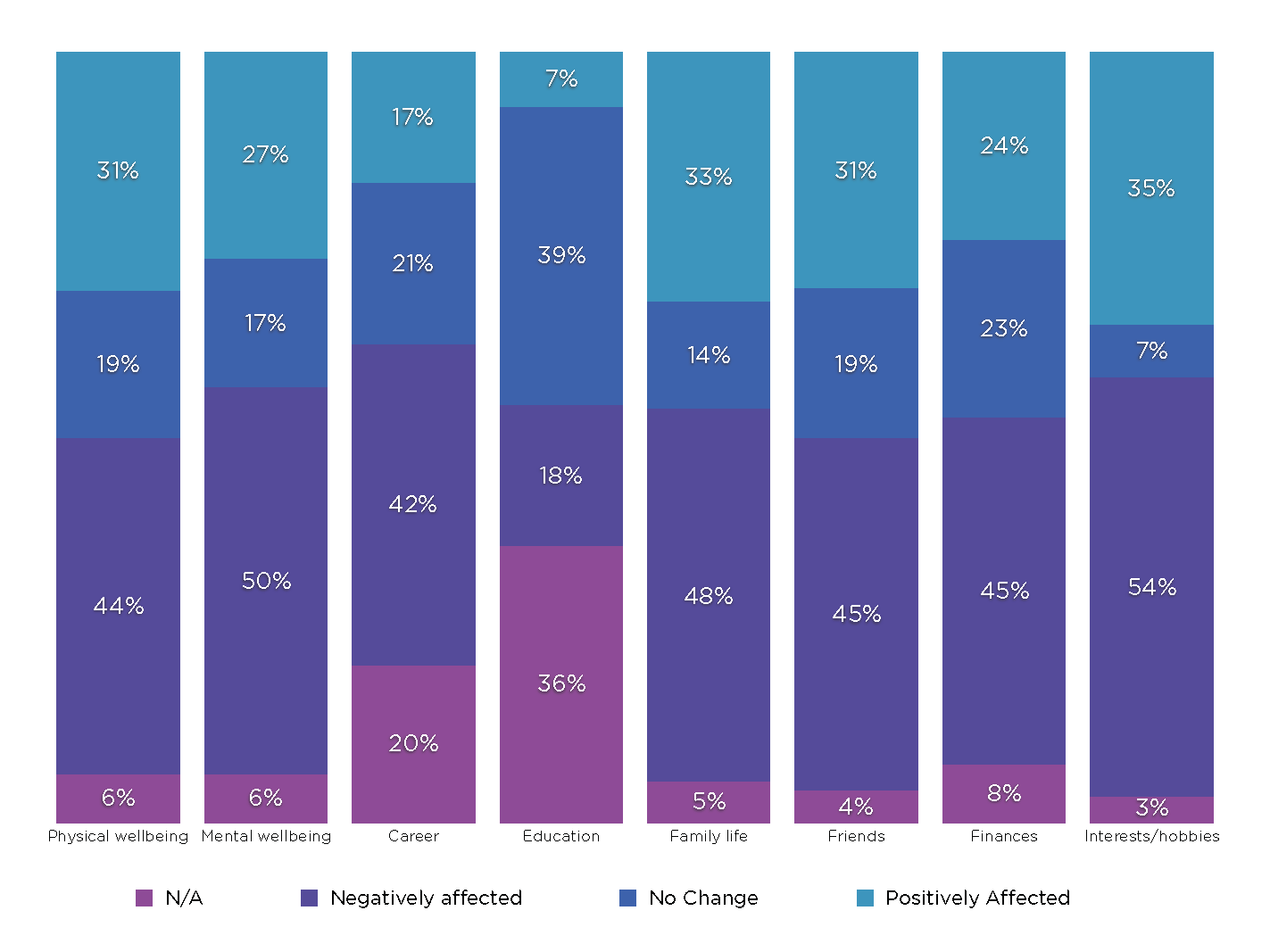
Over half of survey respondents felt that caring had negatively affected their interests and hobbies and their mental wellbeing and over 40% reported that caring had negatively affected their family life, friends, finances, physical wellbeing and career. However, a third of respondents said caring had a positive impact on their hobbies, family life, physical wellbeing and friendships. Those over 60 years old reported that caring had a more positive impact on their personal and social lives.
In interviews and focus groups participants described high levels of exhaustion, stress, lack of sleep, mental health problems and a loss of identity:
...you lose yourself in being a carer - although it's a label, it actually becomes who you are - you are the carer, and that is what actually defines you...
(Edinburgh focus group - daughter caring for mother)
Caring also impacted on their finances, employment opportunities, social and family lives. Despite the negative impact of caring, participants talked positively about those they care for and their commitment to the caring role:
...I don't regret it at all, because he is my champion... he is so stoic - he must be aware of some of the things that are inhibitions to the way he lives his life, and I think he's incredibly brave. He is brilliant, really, but it's tiring.
(Interview 8 - father caring for adult son)
2. Impact of short breaks
Over half of survey respondents (57%) had not had a break from caring. Black and minority ethnic (BME) carers were less likely to have had a break than carers overall; 63% of BME respondents had not had a break from caring. However, short breaks were seen as fundamental to carers to help alleviate the physical and emotional demands of caring and to sustain the caring relationship, preventing admission to residential care:
It's wonderful because I just feel as though I am living again, instead of just being a total carer.
(Interview 3 - mother caring for young son)
...it does help you cope... you know, shortness of temper, you know, frustration... and the thing, when you have had respite and then don't have it, I can then look back and say "my God, that really saved our life", and I mean that literally, you know, saved our family and everything.
(Edinburgh focus group - mother caring for adult son)
Those who experienced a short break were asked about the benefits. Common responses were about 'recharging the batteries', having a chance to 'chill out', 'time to myself', a chance to catch up on quality sleep and a change from 'the routine' of caring.
Breaks from caring enabled carers to spend time on other relationships including partners, other children and friends. Breaks helped carers to top up vital reserves of patience and tolerance. The anticipation of having breaks was part of the positive impact they had on carers' lives, providing something to look forward to and highlighting the importance of the planning process.
3. Experience of short breaks
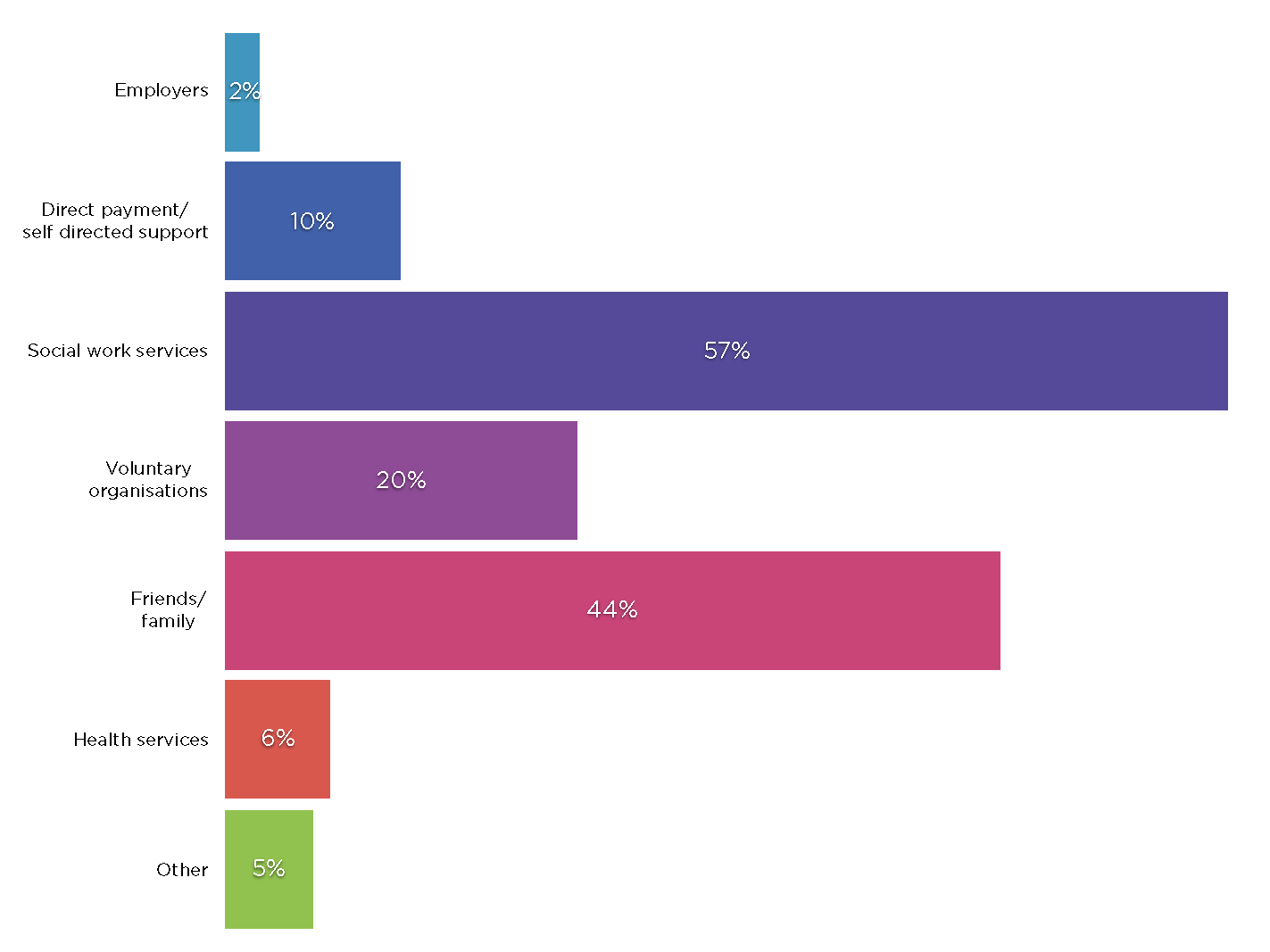
Carers described a range of supports they used to take breaks from caring. Of those survey respondents who had taken a break, 57% indicated that they had used social work services to do so, with the majority of this group also using help from other supports (eg friends, voluntary organisations, health services, Direct Payments) to take a break from caring. Only 2% had used health services exclusively, with a further 4% using health services in combination with at least one other support.
Of those BME carers who had taken a break from caring, 29% said they had used the sole support of social work services to take a break. An additional 13% of BME carers used social services and at least one other support (primarily friends and family or voluntary organisations).
Where carers had used formal services to take a break from caring, they were generally perceived positively if the cared for person enjoyed them. Carers' preferred choice was often for the cared for person to have a break with other family members. In some cases, this was increasingly problematic due to ageing relatives:
....as he gets older, it gets harder because the people who have helped to care for him are getting really old now, so that back up that I've had all his life, is diminishing.
(Interview 12 -mother caring for adult son)
4. Satisfaction with short breaks
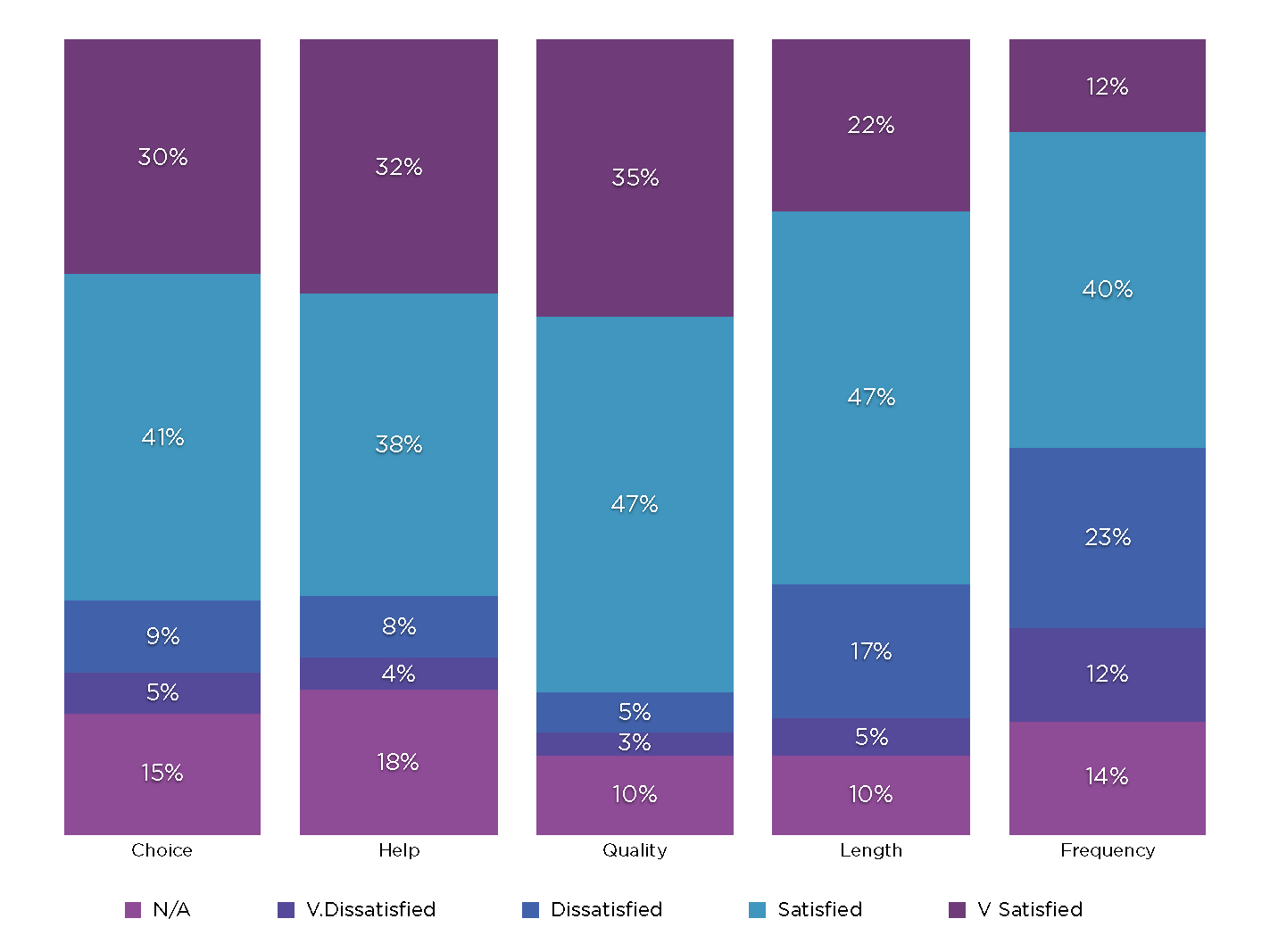
Those who had taken a break were likely to be satisfied with the quality of the break, the choice, support to organise it and the length. Respondents were most likely to be dissatisfied about the frequency of breaks, 35% were either dissatisfied or very dissatisfied. Amongst BME respondents, 58% identified that they were dissatisfied or very dissatisfied with the frequency of their short break. Although the majority of those survey respondents who had received a break were satisfied with the choice available, carers in the interviews and focus groups explained that they often felt their choices were limited.
What was of paramount importance to the carers in the study was the wellbeing of the cared for person and the short breaks provided to them being appropriate and life enhancing. Carers' first priority was that the cared for person was safe, well looked after and happy. This also alleviated feelings of guilt about leaving them. Carers particularly valued short breaks that provided opportunities for the cared for person to engage in social activities and for young people to be part of a peer group:
...it's a group of his own age and roughly his ability, so he feels like one of the boys and one of the gang and also when he comes back he's got lots of things to talk about.
(Interview 9 - Mother caring for adult son)
For carers who had taken short breaks with the cared for person, what supported them most was getting some help with the caring role, including help with meals, to make the break mutually enjoyable.
Participants in the study said they valued personal, trusting relationships with paid carers and that paid carers have a good, consistent relationship with the cared for person:
I don't want a stranger coming into my life. And I think a lot of people might feel like that. [...] It's just trust. You have to know that the person that's been cared for is going to like them, going to have a connection...
(Interview 12 - mother caring for adult son)
They also positively described experiences of services which were both appropriate and personalised to the needs of the cared for person. This theme seemed to be more prominent where participants cared for children or young people:
...it's brilliant, it's appropriate and they have put him into a group with a couple of lads his age.
(Dunfermline focus group - mother caring for teenage son)
Only two carers in the study had experienced Self-directed Support or Direct Payments and both had polarised views. One found it 'brilliant' and felt it offered 'more control', while the other reported that it led to increased paperwork, stress, uncertainty and ultimately to a reduction in funding.
Carers had mixed views about the length of short breaks. Some felt that any length of break had a positive impact, while others felt strongly that the length of the break was fundamental.
Over half of respondents (56%) noted that the level of their breaks had stayed the same over the last two years. Twenty-five percent of respondents noted that the frequency of their breaks had decreased but twenty percent of respondents said that the level of their breaks had increased over the last two years. Of the 45% of survey respondents who said that their level of short breaks had increased or decreased, many gave details as to why they thought this was the case. Some respondents lacked the confidence to trust the caring role to others. Others found breaks too expensive or that the cared for person was reluctant to take one.
Carers reflected in the focus groups and interviews on the impact that changes in provision had on the cared for person. In some cases, participants linked a reduction in short breaks to a deterioration in the cared for person's behaviour:
...95% of the time is horrendously hard work, and 5% of the time he was becoming violent and violent to the extent we had to ring the police to deal with him. And I mean we had two major incidences, and both of them followed a period where he had had no respite whatsoever for three months...
(Edinburgh focus group - mother caring for adult son)
5. Future of short breaks
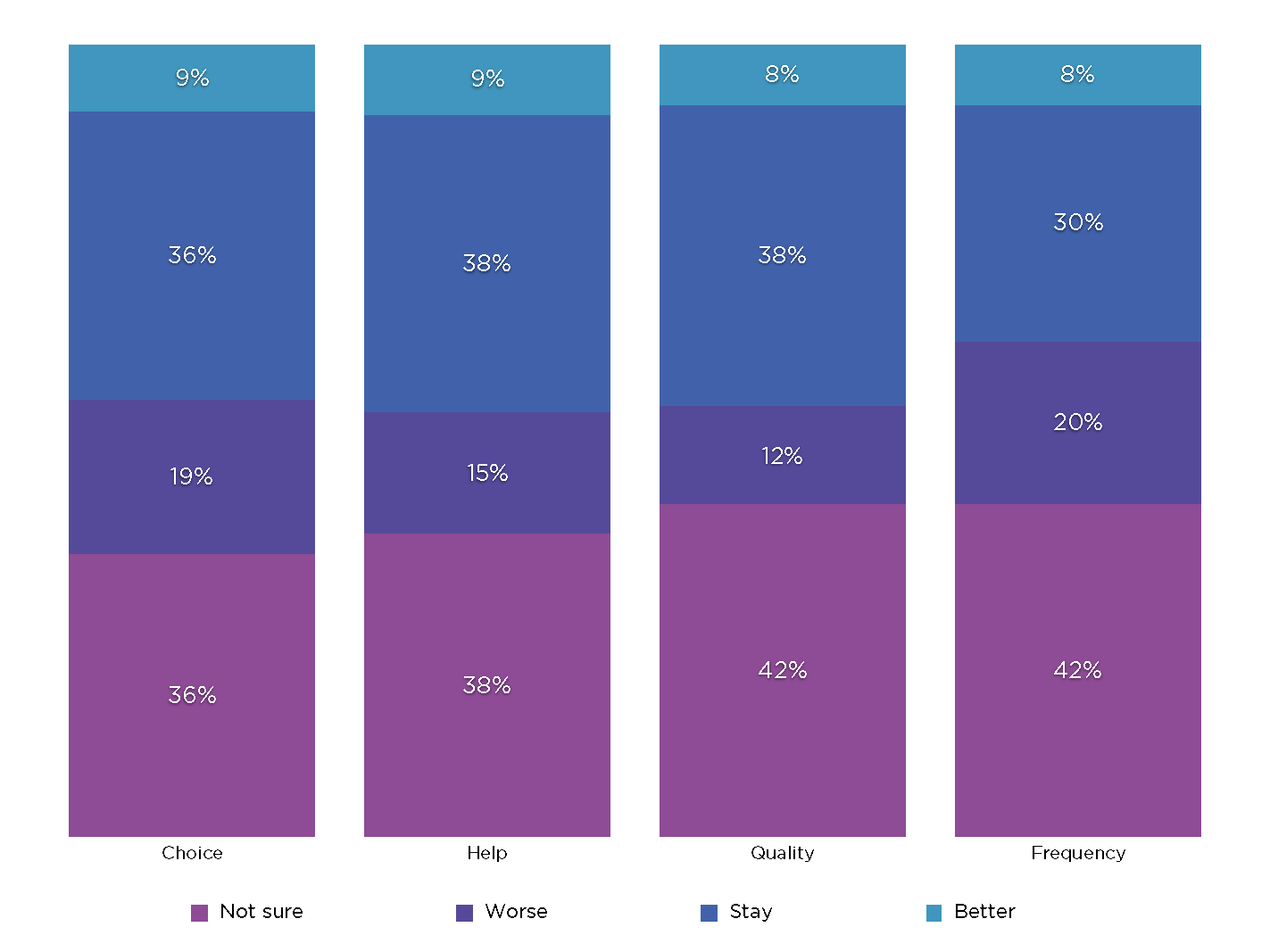
In terms of thinking about the future, survey respondents were asked whether they felt the choice, help/support to arrange breaks, quality or frequency of short breaks would get better, worse or stay the same. Most respondents said that they were 'not sure' about the future of the quality and frequency of breaks. The focus groups and interviews revealed some uncertainty and at times pessimism about the future of short break provision and support for carers:
They are slowly improving; I still think they have a long way to go. I feel like people are like second class citizens really, they don't get enough support from the government...
(Interview 1 - mother caring for young daughter)
Carers seemed acutely aware of reduced financial resources and the impact this would have on the availability of short breaks. There was evidence of concern about the move to Self-directed Support services and Direct Payments placing an additional demand on the carer.
When asked what their ideal future short break provision might look like, participants commonly expressed very modest needs and expectations given the scale of the caring commitment and its impact on their lives:
Well I would be quite happy maybe every six or eight weeks; a couple of nights would be great...
(Interview 10 - wife caring for husband with dementia)
I am not looking for massive amounts... but it would be really nice if three or four times a year I could have one or two overnights where I could plan to do something like go away for a weekend.
(Interview 3 - mother caring for young son)
6. Barriers to breaks
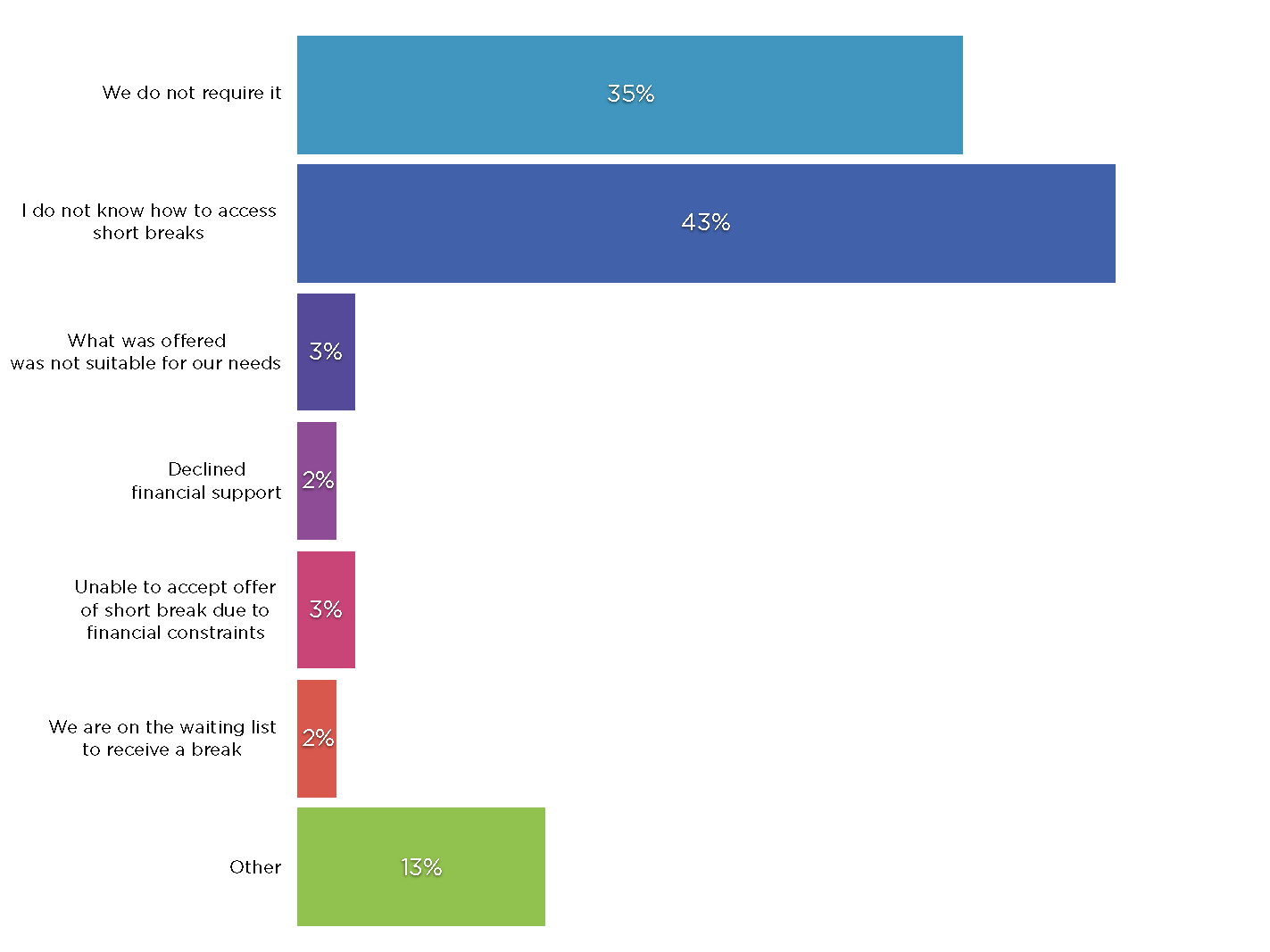
Lack of information
Over half (57%) of survey respondents had not had a short break. Forty-three percent said that this was due to not knowing how to access short breaks, while 35% of respondents had not taken a short break because they did not require it. Those most likely to say this were retired (61%).
Not knowing how to access short breaks was the most common barrier across the different caring situations (eg caring for a partner, child, parent etc) and across the categories of cared for person (eg physical disability, learning disability, long term condition, old age etc). This was also the most common barrier for those up to the age of 59. Those between 60 and 70+ were more likely to have not taken a break because they did not require it.
A lack of information and understanding about short breaks was a prominent theme throughout the focus groups and interviews. Many carers talked about not knowing their entitlements and the difficulty in finding out information. However, sometimes carers were aware of short breaks and respite but still felt confused about how to access it:
...unless you know your rights, what you are entitled to, social work don't tell you anything.
(Interview 13, carer 2 - daughter in law caring for mother in law)
You find out things by accident don't you?
(Glasgow focus group - wife caring for husband)
Battling to be heard
A significant barrier was the difficulty carers experienced when engaging with statutory social services. In discussions with carers, it was common for them to describe accounts of doing battle with social services to get a break from caring. Stories of fighting 'tooth and nail' were numerous:
...I had to kick, scream, shout to get what I have got, and even then I was told that these places were so hard to come by, and they are quite often kept for emergency cases. But my point was who is to say that I am not going to become an emergency case if I don't get it?
(Dunfermline focus group - mother caring for teenage son)
Participants' difficulties often focused on processes involved in the organisation and planning of short breaks. Carers often described the planning processes to access short breaks as impersonal, time consuming, overly bureaucratic and stressful. In some cases, this discouraged them from seeking help altogether:
I think most people would say that bit's probably the hardest part of caring. It's not the care, you know, it's everything else that comes in. It's the filling in forms constantly [...] it's easier to just watch them yourself than go through the process...
(Interview 12 - mother caring for adult son)
Lack of appropriate provision
Another key barrier uncovered through the focus groups and interviews was a lack of appropriate provision for the cared for person. In some cases, what was offered was unacceptable because it was of poor quality or because it was age-inappropriate, resulting in carers turning down the services offered (though only 3% of survey respondents said they had turned down short breaks services due to unsuitability):
Once we hit the adult services... massive problems there because although we were approved funding, there wasn't anything to spend it on because there is nothing appropriate.
(Edinburgh focus group - mother caring for adult son)
In other cases where inappropriate services were offered, this was seen to be due to inadequate assessment of the cared for person by the social worker:
...I was really appalled at what she [the social worker] expected my husband to move into... I said to her, you assessed my husband and you know that was not the place for him - I would never have put him over the door. [...] Honestly, I wouldn't put my cat in there.
(Interview 13, carer 1 - wife caring for husband)
Guilt
Powerful feelings of guilt were common across the carers. This often inhibited them from seeking or taking a break from caring and / or enjoying the breaks they did take. Some felt taking a break amounted to 'admitting defeat' or 'not doing the best you can'. Others talked about getting support as accepting 'charity' or being 'too proud' to ask for help. If the cared for person had a negative attitude towards short breaks or respite, this often exacerbated the guilt carers felt in leaving them. Participants described instances where the person they care for 'flatly refuses to go' to short breaks or doesn't appreciate that the carer needs a break. For some, this is the main barrier to accessing breaks from caring:
I've gone through situations where I'm really exhausted, and he doesn't realise... and that's really a barrier because you can't make him understand that sometimes you need to be away from him. (Dunfermline focus group - wife caring for husband)
Identifying as a carer
Another barrier suggested by the research was that in some cases, participants did not identify as carers. While some people strongly identified as carers, others were unsure if they were 'carers' or simply the spouses, parents and children fulfilling a natural role for their loved ones. This has implications for whether a person providing care will be aware of, or will seek support, including short breaks:
I said 'I think I'm a carer' and she says 'oh you should see somebody' and I said 'I've never seen anyone'.
(Glasgow focus group - wife caring for husband affected by stroke)
Further, carers in the study were unsure about how difficult their situation needed to be to warrant them taking a break. They frequently made comparisons between their situation and those of other carers, imagining others had more pressing needs than them:
I always think that there's people worse off than me...that would need things more than that.
(Interview 7 - mother caring for young son)
...there's a lot more people than me out here, I can't be too demanding [...] I feel that I am the person that is getting the favour [...] I'm grateful, and I just know that out there, there must be a great demand, so I am grateful for what I get.
(Interview 10 - wife caring for husband with dementia)
7. Improving the short break experience
Carers suggested that short breaks could be improved by:
- Being provided as an early intervention rather than at crisis point
- Having increased choice, flexibility, frequency and length of short breaks
- Having more information about carers' entitlements and availability of short breaks
- An increase in appropriate and personalised short breaks, including culturally suitable services for BME carers
- Better planning processes including a single point of contact and dates for short breaks secured well in advance
8. Next steps
In response to the research findings seven key improvement areas have been identified. A detailed account of these areas and actions can be found in section eight of the full report. The improvement areas aim to provide a useful starting point for local discussion around how short breaks are provided, and what can be done to make things better. Local authorities and their planning partners will play a key role in taking this forward with their stakeholders and we are keen to support these efforts in whatever way we can. The key improvement areas focus on:
- Planning for improvement
- Involving carers in decisions about the future development of short breaks
- Extending the reach of short breaks
- Improving information and advice about short breaks
- Meeting the challenges and opportunities presented by Self-directed Support
- Helping families and communities to support each other
- Measuring the reach and impact of short breaks
For more information about this research please contact Ellen Daly.
Project Partners
Iriss, SharedCare Scotland, Coalition of carers in Scotland, Mecopp



